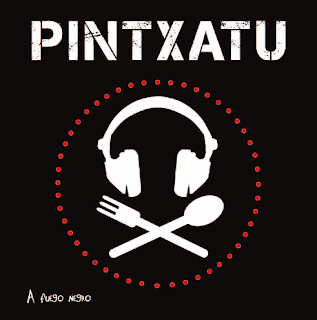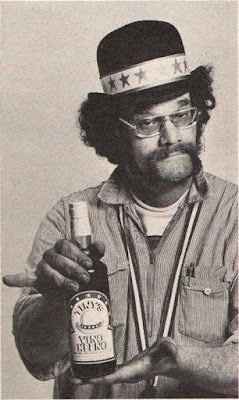Pintxatu
 The Ajimi team was out in the Alde Zaharra of Donostia with a few Basque music industry insiders. Between glasses of crianza and mandatory pintxos we brought up the recent collaboration between Fermin Muguruza, political punk/ hardcore/ ska/ reggae international musical activist, and the trendy local eatery, A Fuego Negro. The project in question was Pintxatu, a smartly designed cookbook highlighting the latest in A Fuego Negro's Fernan Adria-inspired postmodern tapas and an attendant CD of post-rock reggae electronica curated by Muguruza. A few eyes rolled. Questions about Muguruza's sanity and/or commitment to DIY aesthetics and political ideals jokingly made the rounds. But a grudging respect ultimately prevailed for an artist whose creative hunger and boundless energy for collaboration and community found new expression - in a cookbook.
The Ajimi team was out in the Alde Zaharra of Donostia with a few Basque music industry insiders. Between glasses of crianza and mandatory pintxos we brought up the recent collaboration between Fermin Muguruza, political punk/ hardcore/ ska/ reggae international musical activist, and the trendy local eatery, A Fuego Negro. The project in question was Pintxatu, a smartly designed cookbook highlighting the latest in A Fuego Negro's Fernan Adria-inspired postmodern tapas and an attendant CD of post-rock reggae electronica curated by Muguruza. A few eyes rolled. Questions about Muguruza's sanity and/or commitment to DIY aesthetics and political ideals jokingly made the rounds. But a grudging respect ultimately prevailed for an artist whose creative hunger and boundless energy for collaboration and community found new expression - in a cookbook.Pintxatu punningly takes its name from pintxos, the Basque version of tapas, and Murguruza's legendary punk band, Kortatu. I'm quite sure that the man who penned the enduring anti-anthem, Mierda de ciudad, never expected to be creating a soundtrack for your dining pleasure.
The conceit of the cookbook is 19 different dishes with 19 different songs to complement and highlight each culinary experience. The food, largely crafted and designed by star chef Edorta Lamo is alternately, sometimes simultaneously, amusing and appalling. Under the spell of molecular cuisine and kitchen science 101, such flights of fancy as Sangre Crujiente - frozen blood sausage balls tossed into the deep fryer - are submitted for your approval, and take you into a culinary twilight zone. This metaphorical mix of revenge and passion also includes squid ink and leek ash, among a host of ingredients. Or how about a seafood Koktela surrounded by a foam of bitters and vermouth, topped with a lemonade foam? These are just the tip of the iceberg in a book filled with impossible-to-make recipes and often questionable combinations. And for every cook who's embraced the pretense of the molecular food revolution, Ajimi suggests spending some time with food scientists at General Foods or Kraft to see how the big kids do it.
Nonetheless, even though it's a perfectly useless cookbook (do you really want to burden your kitchen and your life with a whippit containers, obscure you'll-only-use-once ingredients or a shelf full of various gelatins and gums?) it's brilliantly designed, quite amusing and will certainly become an historical window on the ideas of the times.
There's even a specious introduction espousing a a rather quaint European philosophy of negritude. Connecting the innovative Basque cuisine and music to the development of black music in America is a rather big leap. And it's picked up by some rather embarrassing recipes in the book. Case in point is Afro Txipi, a variation on the tried and true Txiperones en su tinta (squid in its own ink), but this one creating a sepia-infused edible 'fro to anthropomorphise a cooked squid into something signifying a black person. But it's food for thought. Something to muse over while eating a grilled cheese sandwich - which technologically speaking is a pretty wild experiment with wheat, yeast and milk and rennet.
So, who are we to pass judgement on contemporary food trends?
As for the musical accompaniment, it's a mix of derivative electronica (isn't it all!) with a lot of reggae and ska. When not being downright embarrassing or unlistenable, most of the tracks seem a bit like afterthoughts by artists who are generally more thoughtful. Highlights include Muguruza's own offering, Kamakaze's nutty rap Cuenta Remix and Selector Matanzas' Latin groove Arroz con Coco.
Despite Ajimi's rather critical take on Pintxatu, for some reason we still love the book - whether its fleeting topicality, the fact that a good friend was involved, the genuinely great visuals and design of the book object or the magic of Donostia and all it represents musically and foodily.
NV


Comments